Robert Quotes in The Immortalists
It occurs to Simon that he would like to have a life like this: a career, a house, a partner. He’s always assumed that these things are not for him—that he’s designed for something less lucky, less straight. In truth, it is not only Simon’s gayness that makes him feel this way. It’s the prophecy, too, something he would very much like to forget but has instead dragged behind him all these years. He hates the woman for giving it to him, and he hates himself for believing her. If the prophecy is a ball, his belief is its chain; it is the voice in his head that says Hurry, says Faster, says Run.
In the final piece, The Myth of Icarus, Simon will perform his first starring role: he is Icarus, and Robert is the Sun.
On opening night, he soars around Robert. He orbits closer. He wears a pair of large wings, made of wax and feathers, like those Daedalus fashioned for Icarus. The physics of dancing with twenty pounds on his back compounds his dizziness, so he is grateful when Robert removes them, even though this means that they have melted, and that Simon, as Icarus, will die.
Robert paces the apartment. “We need to stay here,” he says. They have enough food for two weeks. Neither of them has slept in days.
But Simon is panicked by the thought of quarantine. He already feels cut off from the world, and he refuses to hide, refuses to believe this is the end. He’s not dead yet. And yet he knows, of course he knows, or at least he fears—the thin line between fear and intuition; how one so easily masquerades as the other—that the woman is right, and that by June 21st, the first day of summer, he’ll be gone, too.
“I wish—I wish…”
“Don’t wish it. Look what she gave me.”
“This!” says Klara, looking at the lesions on his arms, his sharp ribs. Even his blond mane has thinned: after an aide helps him bathe, the drain is matted with curls.
“No,” says Simon, “this,” and he points at the window. “I would never have come to San Francisco if it weren’t for her. I wouldn’t have met Robert. I’d never have learned how to dance. I’d probably still be home, waiting for my life to begin.”
“The thought that you could die from sex,” Varya says, haltingly. “You weren’t terrified?”
“No, not then. Because it didn’t feel that way. When doctors said we should be celibate, it didn’t feel like they were telling us to choose between sex and death. It felt like they were asking us to choose between death and life. And no one who worked that hard to live life authentically, to have sex authentically, was willing to give it up.”

Robert Quotes in The Immortalists
It occurs to Simon that he would like to have a life like this: a career, a house, a partner. He’s always assumed that these things are not for him—that he’s designed for something less lucky, less straight. In truth, it is not only Simon’s gayness that makes him feel this way. It’s the prophecy, too, something he would very much like to forget but has instead dragged behind him all these years. He hates the woman for giving it to him, and he hates himself for believing her. If the prophecy is a ball, his belief is its chain; it is the voice in his head that says Hurry, says Faster, says Run.
In the final piece, The Myth of Icarus, Simon will perform his first starring role: he is Icarus, and Robert is the Sun.
On opening night, he soars around Robert. He orbits closer. He wears a pair of large wings, made of wax and feathers, like those Daedalus fashioned for Icarus. The physics of dancing with twenty pounds on his back compounds his dizziness, so he is grateful when Robert removes them, even though this means that they have melted, and that Simon, as Icarus, will die.
Robert paces the apartment. “We need to stay here,” he says. They have enough food for two weeks. Neither of them has slept in days.
But Simon is panicked by the thought of quarantine. He already feels cut off from the world, and he refuses to hide, refuses to believe this is the end. He’s not dead yet. And yet he knows, of course he knows, or at least he fears—the thin line between fear and intuition; how one so easily masquerades as the other—that the woman is right, and that by June 21st, the first day of summer, he’ll be gone, too.
“I wish—I wish…”
“Don’t wish it. Look what she gave me.”
“This!” says Klara, looking at the lesions on his arms, his sharp ribs. Even his blond mane has thinned: after an aide helps him bathe, the drain is matted with curls.
“No,” says Simon, “this,” and he points at the window. “I would never have come to San Francisco if it weren’t for her. I wouldn’t have met Robert. I’d never have learned how to dance. I’d probably still be home, waiting for my life to begin.”
“The thought that you could die from sex,” Varya says, haltingly. “You weren’t terrified?”
“No, not then. Because it didn’t feel that way. When doctors said we should be celibate, it didn’t feel like they were telling us to choose between sex and death. It felt like they were asking us to choose between death and life. And no one who worked that hard to live life authentically, to have sex authentically, was willing to give it up.”











